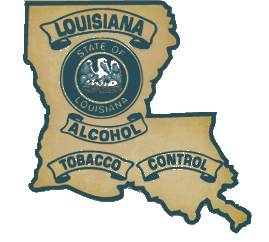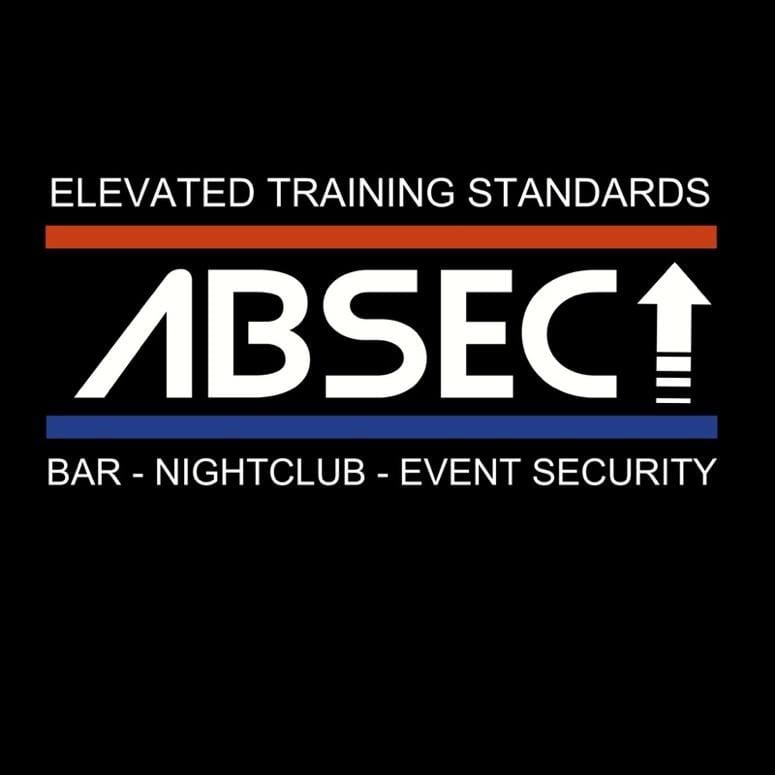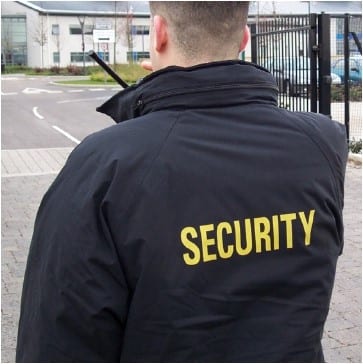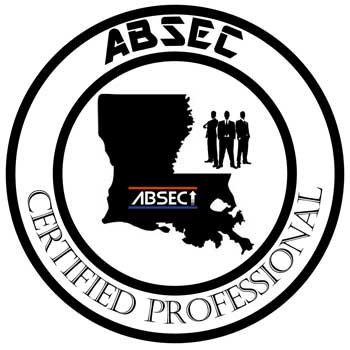Bouncer Certification – Louisiana ATC Security Certification
The Louisiana ATC Bouncer Certification is required for any and all employees of an ABO establishment that may be called upon to respond to a disturbance.
The certification requires that both the Responsible Vendor certification AND the Security Certification have been successfully completed and are valid and current. You can check the status of your certification by following the instructions on THIS PAGE.
One of the most challenging and important roles in an alcoholic beverage outlet is that of the person or persons assigned the role of “bouncer” or “security”. Dealing with aggressive, intoxicated and potentially violent individuals can be extremely difficult and dangerous. With proper training, knowledge and clearly defined protocols, successfully de-escalating situations and resolving conflict can be a regular occurrence.
ABSEC LLC can provide you with the knowledge and training needed to ensure a safe and successful career in this arena. ABSEC LLC is an ATC Authorized Provider for this certification.

Course attendees will be introduced to the job responsibilities of an ABO security staff member. They will learn to handle the job in a professional, safe, and efficient manner, thereby reducing liability for themselves and their employers while maximizing safety and security at their respective establishment.

The role of a Security Staff member
When you are hired as a security staff member to an A.B.O. you assume much liability and responsibility. Many of the people hired for this purpose are selected solely because of their size and /or intimidation factor.
In reality, the job requires discretion, tact, and exceptional communication skills. Many of these individuals are very professional and conduct themselves properly under any and all circumstances.
Some, however, do not. Because of lack of training, they place their establishment in a precarious liability situation and potentially endanger other patrons. In today’s overly litigious society this is an unacceptable risk for the A.B.O. owner.

The responsibilities of the A.B.O. security staff employee are:
- Ensure the safety of the patrons and staff of the establishment.
- Handle any problem or disturbance that arises throughout the course of business hours.
- Confront physically aggressive people in a controlled manner.
- Provide unbiased assistance and service to patrons.
- Identify potentially dangerous situations and bring them to the attention of management.
- Check identification of patrons.
- Identify crimes that have been committed in the
- establishment and report them to the police.
- Complete incident reports of problems that occurred
- in the establishment.
- Escort employees carrying money or valuables.
- Identify intoxicated persons.
- Escort patrons to their vehicles and/or find alternate transportation for intoxicated patrons.
- Give accurate statements to law enforcement.
This list summarizes the basic job functions of the security employee. It should be apparent that any individual chosen to perform this job should be mature, professional and responsible. The Bouncer Certification course will cover this and other aspects of this assignment.
Personal and residual liability:
Before a person becomes involved in any type of security work, they must fully understand the implications of liability in the industry.
Personal liability–
Regardless of training, judgement, or apparent professionalism, the employee can face an endless variety of accusations by individuals wishing to sue, criminally charge, or otherwise challenge the staff member’s decisions. The bottom line is that security staff will be held personally responsible for actions that are not deemed reasonable and necessary. This could include civil and/or criminal penalties.
Residual liability–
In light of a poor, incorrect, illegal or otherwise unreasonable decision made by a staff member, the business owners can and will be held responsible as well, especially in civil proceedings.
Based on this inevitable reality, and the nature of the business, business owners should be prepared to legally defend themselves if such situations arise.
Criminal vs. civil:
To clarify the difference, a criminal accusation is in regards to an actual crime that may carry criminal penalties such as fines, jail time, etc. Criminal complaints are handled by the appropriate law enforcement agency.
A civil judgement, on the other hand, is handled in civil court, and may result in fines or other judgments against the accused.
ENROLL NOW in the BOUNCER CERTIFICATION course to see the rest of the content that is previewed here.
What makes an effective security professional:
Several factors determine the effectiveness of the security staff. If these initial standards are kept in mind, your job will be much easier. You will also bring a positive reflection on yourself, your workplace and your employer.
Appearance–
In order to present a professional image, the security professional must dress appropriately. The proper clothing portrays the individual in an official role. This wardrobe will very from place to place. In a higher end club, this outfit should ideally be a dark suit or sport coat and slacks.
A legible “Security” name tag should accompany this, along with properly shined shoes. Tie is optional depending on risk potential of the establishment. In a dance club or bar where fights are frequent, security should wear clearly marked t-shirts or polo shirts with slacks or presentable jeans.
In any event, proper dress clearly identifies security and appears organized to the public.
Avoid items of clothing that may be intimidating to customers.
Communication skills–
Good communication skills are probably the most important aspect of a security employee.
The ability to clearly communicate with others is absolutely essential in performing a security task. In addition to clear communication, the security employee must be able to use sound judgment and rationale in order to effectively interact with individuals who are aggressive, upset, intoxicated and injured.
In most situations, effective dialogue can diffuse a potentially violent incident. Security employees should always work to improve their approach and communications skills in order to be most productive and avoid confrontations.
Observation skills–
Good observation skills are essential. The ability to observe the environment and process details are key to longevity in the job. This applies to personal and public safety, the recall of important facts, and the ability to interpret the overall situation as it relates to safety and security. Simply put, observation skills are a cornerstone of any security operation.
Self-control–
Like good communication, self-control is a prerequisite to hold a security job. Many times, problem patrons will try to provoke or insult security in order to cause them to lose control.
If this happens, the A.B.O. will most certainly lose in the long run. Loss of control can lead to unnecessary fights, insults, injuries and lawsuits. Security staff must learn to be emotionally detached from comments and threats made by problem patrons.
Like law enforcement, the job is not person and sometimes you cannot make everyone happy. But if you lose control, you can make them wealthy at your expense.
Posture–
Good erect posture is essential for a security staff member. Think of it as a non-verbal communication.
When a security staff member has good posture and a strong presence, authority is very easy to establish. It appears that you can follow up on commands in a professional unwavering way. Good posture also allows for an expanded field of vision.
Confidence–
Strong confidence is necessary for making tough decisions. It is related to posture because it is also a non-verbal communication.
A person who is able to make a confident unwavering decision will be far more respected than someone who is unsure or afraid. Along with confidence comes respect.
Respect can be immediately earned from a calm confident person. Confidence also allows for more effective and decisive action in a situation that has quickly turned violent.
Physical fitness–
Physical fitness aids in most of the other qualifications required in being an effective security member. If one is physically fit, it is easier to develop confidence, posture and self-control.
Security professionals should always maintain a reasonable level of fitness because of the demands of the job.
Basic legal knowledge–
This is necessary to understand the implications of actions taken during the course of duty.
It is also helpful in determining if and when to involve law enforcement into a situation. A part of this knowledge should deal with the ability to give a clear statement, knowing how to properly articulate self-defense, or the defense of others.
Clear writing skill also applies to this requirement as well.
These elements should be considered fundamental qualifications for the job at hand.
The “Safety Mindset”:
Safety is absolutely the top priority for the security staff member.
Most security decisions will be traceable back to a safety catalyst, and should be articulated as such. Many times, what is or was a safety concern is justified by other reasons, and may therefore be challenged in a later legal proceeding.
Quite simply, it is difficult to argue with a reasonable judgement, made with safety in mind.
The staff member is encouraged to develop a safety based mindset. If this is accomplished, situations can be viewed in a way that is more beneficial to patrons, other staff members, and owners. To view situations and interactions in this way can require a bit of practice, but the results are worth it for an overall better business environment.
Communication- The Equalizer:
Communication skill tops the list of attributes for the security job. It is absolutely essential to effectively communicate both verbally and in writing. Good communication greatly lessens the chance of a situation escalating. In fact, the vast majority of the time, NO physical force is necessary to handle a disturbance.
Good communication for the security job can be broken down into several parts that work together in a synergistic way:
Body language–
It has been said that most of our communication is non verbal.
Non threatening body language can diffuse anger and help gain a person’s trust. Non threatening body language can include good eye contact, open hands, smiling (when applicable), etc.
Also, non threatening body language can be developed to have a tactical applications, such as thwarting surprise attacks or creating reaction distance.
Word usage–
Be mindful of the words that you use when addressing a person who may be upset. A simple shift of words used such as “What’s the problem? vs. What’s YOUR problem?” can make all the difference in avoiding an altercation. In any case, being respectful and socially sensitive to the person being addressed is essential.
Tone–
Obviously, the tone of voice used can project attitude. A calm and reassuring tone can sometimes settle a situation down just because of the demeanor and apparent self-control of the speaker.
Rapport–
Good rapport is a cornerstone to any good customer service, sales, or conflict management program. The ability to adjust to the same “wavelength” or be otherwise “in sync” with a person works rapidly to diffuse hostilities and gain control of a situation.
Rapport is a practiced social behavior and can be understood as one of the main elements of success of great communicators.
Empathy–
Empathy is necessary when addressing an angry or upset person. At first, the cause of the problem may or may not be known. It may actually be for a good reason that the person is upset. In any case, empathy can help the problem to be understood more effectively, and therefore solved (or at least temporarily managed) at a deeper level.
Listening–
Listening is probably the most neglected part of the communication look in the security and/or law enforcement fields. Listening allows a much more complete understanding of the problem, and actually buys a little time for an upset person to calm down while they explain their issue. Admittedly, in the security business, problems must be handled promptly, but good listening skills adapted to a fast moving situation can definitely affect the totality of the circumstances, allowing the staff member to make a much more informed decision.
Social intelligence–
Social intelligence is the ability to adapt a person’s communication style to effectively fit differing social groups. It could be called, “being hip to the crowd.” It is a fact that social groups are distinctly different, and require a different style of interaction. These social groups may be different based on age, ethnicity, income level, cultural difference, education level, etc. But, even though there are vast differences, the common denominator in being effective when communicating to different groups is the element of respect. When someone feels respected, the lines of communication tend to flow much easier, even though there may be such differences. Another key element in social intelligence is humility. Humility does NOT mean presenting a weak or ineffective appearance, nor does it mean being a pushover. It means being respectful and mindful of differences while maintaining a professional and courteous demeanor.
ENROLL NOW to experience the rest of this invaluable content and get your Louisiana ATC Bouncer Certification.


